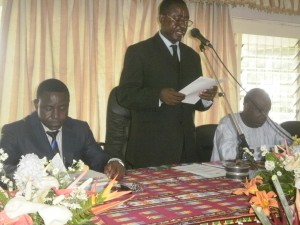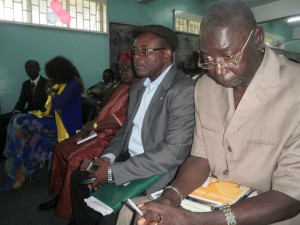By Walter Wilson Nana
The Buea-based Local Government Training Centre, known in the French acronym as CEFAM is on a nationwide information and sensitisation campaign.
At the Buea stopover, the CEFAM team leader, Moses Ebah Metuge, who doubles as the Chief of Administration & Finance said their intention is to reach out to the stakeholders of Cameroon’s decentralisation process with up-to-date training opportunities. “We want to ensure that the training programmes and our activities carried out in CEFAM tie with the needs in the field. CEFAM is interested to join the Councils in the decentralisation process of the country,” he mentioned. He will add that the information and sensitisation workshop is a package of how equipped and updated CEFAM is in their mission to provide quality training, which will enable councils and other parties in the decentralisation process provide better services for the development of their communities.

The Southwest Governor's Office, Clement Fon Ndikum in his opening remarks at the CEFAM Information workshop in Buea
Ebah said the Decree No. 77/494 of December 7 1977 creating CEFAM as the sole State institution providing training on council management in Cameroon, empowers them to train, retrain and conduct refresher courses for councils, the supervisory authority and officials of the civil status. “Since its inception, CEFAM continues to enjoy patronage from the councils of this Region, who have regularly sent in their trainees and invited CEFAM trainers to provide short courses on specific themes,” he added.
Explaining the various training cycles, especially the re-organisation of Cycle III (the outreach programmes), the short and long courses available at CEFAM, one of their trainers, Vincent Anu said their offers are rich and relevant. “We’re looking forward to enrol participants for the short courses that have been planned for the January – February 2013 session,” he said.
According to Anu, the challenges of decentralisation are enormous “but we are upbeat that with the relentless collaboration from our partners, you the council authorities, we shall, in a collegiate manner strategise via appropriate trainings, make decentralisation a reality in Cameroon.”
Ekale Mukete, Mayor, Kumba I Council expressed enthusiasm with the programmes offered by CEFAM, especially the short and practical courses, but he was uncomfortable with the fees charged for a trainee that has to be borne by the council coffers. “In the area of cost, the CEFAM fees are too high. There are several agencies involved in the decentralisation process – PADDL, GIZ, PNDP, FEICOM and MINATD, they should take into consideration the cost of training. The councils are key elements in the decentralisation process. An average cost of a trainee is FCFA 400,000. Only few and the rich councils will be able to pay for that which is not good for Cameroon’s decentralisation process. My wish is that the trainings should be partially or fully subsidised by the aforementioned institutions,” he said.
Elizabeth Esele Bekomba, Mayor, Mundemba Council promised to send more of her staff for capacity building at CEFAM. “That has always been top of my priority but the money to facilitate that exercise is not always available. We have to project the growth of our councils whether we shall be back or not and update the staff in the various departments,” she said.




